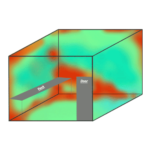Ensuring Security in Refrigerated Vans
In the world of Refrigerated Vans security where the smooth and safe transport of goods is paramount, security is a crucial element.  Nowhere is this more evident than in the transportation of temperature-sensitive cargo. Refrigerated vans play a pivotal role in this process, acting as guardians of perishable goods during transit. In this article, we’ll explore the security measures that ensure the safety of the cargo, the importance of these measures, and their real-world applications.
Nowhere is this more evident than in the transportation of temperature-sensitive cargo. Refrigerated vans play a pivotal role in this process, acting as guardians of perishable goods during transit. In this article, we’ll explore the security measures that ensure the safety of the cargo, the importance of these measures, and their real-world applications.
First a quick plug – Our sister companies ‘Fresh Logistics‘ whom are Refrigerated Couriers and ‘Fresh Fridge Hire‘ are out (compliant GDP) refrigerated vehicle hire
| Key Takeaways |
| 1. Comprehensive Security in Logistics |
| – Security measures in refrigerated vans and vehicles must be comprehensive to ensure cargo protection and transportation efficiency. |
| 2. Preservation of Perishable Goods |
| – Temperature-sensitive cargo relies on measures like temperature monitoring, access control, and locking mechanisms to safeguard product quality during transit. |
| 3. Immediate Response to Security Threats |
| – Alarms and alerts, whether in refrigerated vans or vehicles, play a crucial role in responding quickly to security breaches, preventing theft, damage, and spoilage. |
Refrigerated Vans Security Measures
Temperature Monitoring
One of the fundamental security measures in refrigerated vans is temperature monitoring. These systems are designed to continuously track the internal temperature of the van, serving as vigilant custodians of the cargo. This real-time monitoring enables immediate action in the event of temperature fluctuations, ensuring that goods remain in optimal condition from the point of origin to their final destination.
Temperature monitoring is especially critical in industries where the integrity of the cargo relies on maintaining specific temperature ranges. For example, in the pharmaceutical industry, refrigerated vans equipped with temperature monitoring systems are essential for transporting temperature-sensitive medications. These systems provide constant updates, guaranteeing the integrity of the medicines.
Access Control
Controlling who can access the interior of a refrigerated van is of utmost importance. Access control systems are employed to regulate entry, ensuring that only authorised personnel can open the van’s doors. This measure safeguards the integrity of the goods and prevents unauthorised access.
In the food distribution industry, access control systems are widely used to limit access to refrigerated vans. This ensures that only trained personnel with knowledge of food safety protocols can handle and transport food items. It’s a critical step in maintaining the safety and quality of the cargo, especially in an industry where even minor temperature fluctuations can lead to spoilage.
Locking Mechanisms
Locking mechanisms in refrigerated vans go beyond simple padlocks. They often feature additional security elements like tamper-evident seals and digital locking systems. These robust and reliable systems are designed to prevent theft or unauthorised access to the cargo. In the floral industry, for instance, delicate and valuable flowers are often transported in refrigerated vans with digital locking mechanisms to protect them during transit.
Locking mechanisms play a vital role in maintaining the integrity of goods by ensuring they protected throughout the journey. The introduction of digital locking systems has added an extra layer of security. With features like passcodes, encryption, and remote control, making it harder for potential thieves to breach the cargo’s defences.
Alarms and Alerts
Alarms and alert systems are the rapid responders in the security arsenal of refrigerated vans. They are equipped to detect temperature fluctuations and unauthorised access and trigger immediate alerts. If the temperature deviates from the specified range or if there’s an attempt to breach the van, alarms sound, and alerts are sent to designated individuals. This ensures swift action to rectify any security breaches.
In the dairy industry, alarms and alerts are invaluable. If the temperature in a refrigerated van deviates from the optimal range, the system sends an alert, allowing for immediate corrective measures. This is crucial to prevent spoilage and maintain the quality of dairy products during transportation.
Real-World Examples of Refrigerated Vans Security
Now, let’s take a look at some real-world examples of how these security measures are successfully applied in different industries:
Pharmaceutical Industry
In the pharmaceutical sector, maintaining the integrity of medications is non-negotiable. The effectiveness of medicines is directly linked to their storage conditions, especially when they are temperature-sensitive. Temperature monitoring systems in refrigerated vans play a critical role in ensuring that medications remain within the required temperature range, guaranteeing their effectiveness. Without these systems, the safety and efficacy of pharmaceutical products could be compromised, potentially endangering lives.
Food Distribution by Refrigerated Vans
Access control is a fundamental security measure extensively used in the food distribution industry. Its primary goal is to limit access to refrigerated vans, ensuring that only trained and certified personnel handle and transport food items. This practice significantly reduces the risk of contamination or spoilage during transit. Given the strict food safety regulations and the importance of delivering fresh and safe products to consumers, access control is indispensable in the food distribution sector.
Floral Industry
In the floral industry, where the aesthetic and monetary value of delicate and valuable flowers is exceptionally high, digital locking mechanisms have proven to be a game-changer. These advanced systems protect flowers during transportation, ensuring that they arrive at their destination in perfect condition. The ability to secure the cargo with digital locks not only prevents theft but also maintains the temperature and humidity levels necessary to preserve the freshness and beauty of the flowers.
Dairy Products
The dairy industry relies heavily on the freshness and quality of its products. Any deviation in temperature during transportation can lead to spoilage, affecting both taste and safety. Alarms and alert systems are crucial in this industry. They quickly respond to any temperature fluctuations in refrigerated vans, ensuring that dairy products maintain their freshness and quality. With the help of these systems, the dairy industry can guarantee that their products reach consumers in the best possible condition.
These examples highlight the effectiveness of these security measures in safeguarding valuable cargo.
Comparing Refrigerated Vans Security and Vehicle Security
While refrigerated van security focuses on safeguarding the cargo, vehicle security is concerned with the overall safety of the transportation process. The synergy between these two facets of security is crucial for successful logistics operations. Let’s compare and contrast security measures in refrigerated vans and vehicles and understand how they work together to ensure transportation security.
| Security Measure | Description |
| GPS Tracking | Allows for real-time monitoring of vehicle location, ensuring that vehicles are on the right route and that their whereabouts are known at all times. |
| Immobilisers | Prevent unauthorised use of the vehicle, rendering it useless to potential thieves. |
| Vehicle Alarms | Act as a deterrent and provide immediate alerts in the event of a breach, allowing for a rapid response. |
| Keyless Entry Systems | Offer secure and convenient access to the vehicle while reducing the risk of unauthorised entry. |
GPS Tracking
In vehicle security, GPS tracking plays a pivotal role. It provides real-time location information, allowing businesses to track their vehicles’ whereabouts. This not only aids in route optimization but also facilitates vehicle recovery in case of theft. GPS tracking ensures that vehicles are on the right route and that their locations are known at all times.
Example: In the logistics industry, GPS tracking is used to monitor the movement of delivery vehicles, ensuring timely and secure deliveries to customers.
The inclusion of GPS tracking systems in vehicle security offers several advantages, such as real-time monitoring, route optimization, and improved security in the event of theft. This technology has revolutionised the transportation industry, providing businesses with unprecedented control and security.
Immobilisers
Another vital aspect of vehicle security is immobilisers. These are anti-theft devices designed to prevent unauthorised use of the vehicle. Immobilisers often come with transponders that communicate with the vehicle’s engine control unit. If an unauthorised attempt is made to start the vehicle, the immobiliser will prevent it from starting.
Example: In the automotive industry, modern vehicles are equipped with immobilisers as a standard security feature. This technology has significantly reduced vehicle theft.
The implementation of immobilisers has been a game-changer in vehicle security. It not only acts as a strong deterrent to theft but also ensures that even if a thief gains access to the vehicle, they cannot start it without the correct transponder or key.
Vehicle Alarms
Vehicle alarms are a familiar feature in vehicle security. They come in various types, including audible alarms that sound when there’s a security breach. These alarms serve as deterrents to potential thieves and can also alert the vehicle owner or a security service.
Example: In the car rental industry, vehicle alarms are crucial to protect rental cars from theft or vandalism.
Vehicle alarms contribute significantly to vehicle security by acting as visible and audible deterrents to thieves. The immediate alert provided by these alarms ensures a rapid response to any security breach, minimising the risk of theft or damage.
Keyless Entry Systems to Refrigerated Vans
Keyless entry systems are not only convenient but also enhance vehicle security. These systems often feature advanced security measures, such as encrypted communication between the key fob and the vehicle, making them resistant to hacking or theft.
Example: Many modern vehicles are equipped with keyless entry systems, enhancing both security and convenience for the driver.
Keyless entry systems have become increasingly common in vehicles, offering convenience and enhanced security. They utilise advanced encryption methods to prevent unauthorised access, making it challenging for hackers to intercept or duplicate the key fob’s signal.
Ensuring a Secure Future of Refrigerated Vans
The security of both refrigerated vans and vehicles is paramount in logistics. In a world where the safe and timely transport of goods is crucial, a comprehensive security approach is essential. Temperature monitoring, access control, locking mechanisms, alarms, and alerts in refrigerated vans ensure the safety of perishable goods during transit. On the other hand, GPS tracking, immobilisers, vehicle alarms, and keyless entry systems play key roles in vehicle security.
To ensure a secure future in logistics, businesses and individuals must prioritise security measures in both refrigerated vans and vehicles. By implementing these security measures. They not only protect their valuable cargo but also contribute to the efficiency and reliability of the transportation process. Whether it’s safeguarding temperature-sensitive medications, preventing unauthorised vehicle access, or deterring potential thieves, security measures are the backbone of a successful logistics operation.
Conclusion
In the world of logistics, where the safety of perishable goods and the reliability of transportation are paramount. Security measures in both refrigerated vans and vehicles are non-negotiable. These measures ensure that cargo arrives at its destination in optimal condition and that the transportation process is efficient and secure.
By understanding the role of temperature monitoring, access control, locking mechanisms, alarms, and alerts. In refrigerated van security, and the significance of GPS tracking, immobilisers, vehicle alarms, and keyless entry systems in vehicle security. Logistics professionals can create a robust security framework. This framework not only protects their valuable cargo but also contributes to the overall success of their operations.
Security is not an option; it’s a necessity in the world of logistics. Prioritising security measures in refrigerated vans and vehicles ensures a secure and prosperous future in the industry.
















